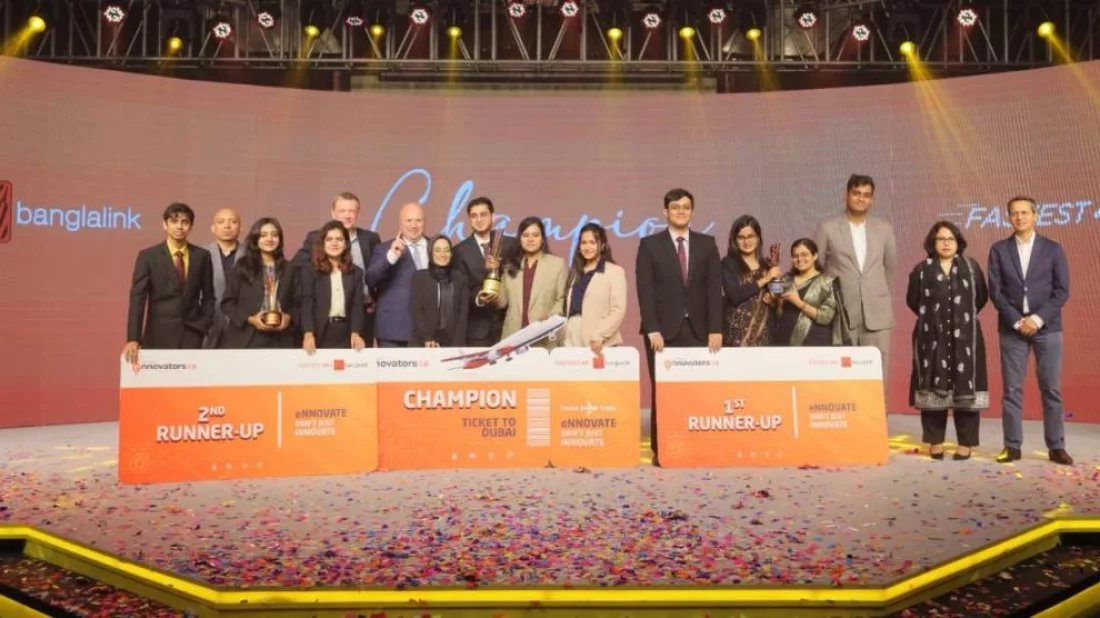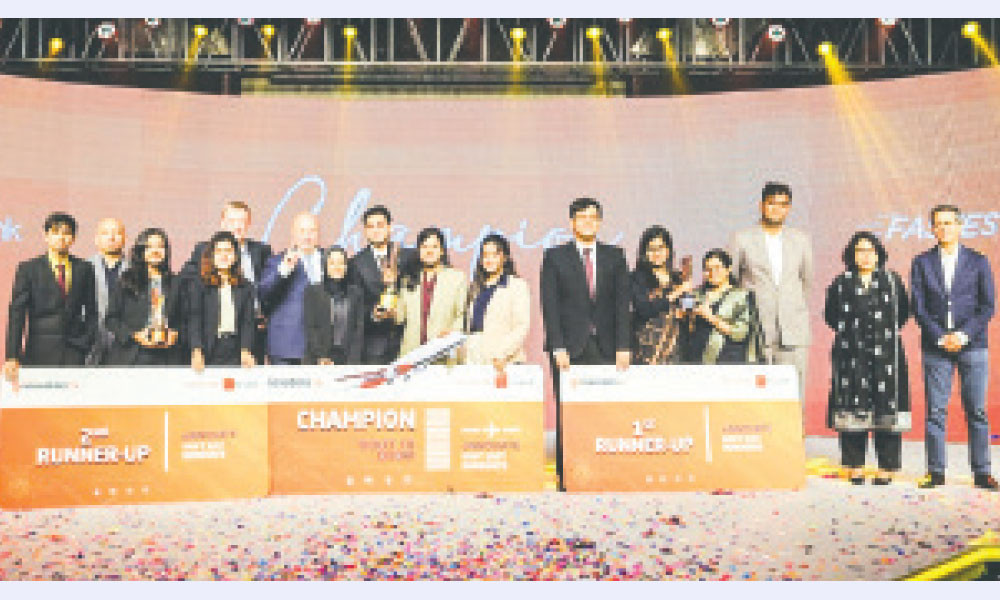NEWAccess my comprehensive AI course collection at Salman's Sessions!
A dedicated NLP-HCI researcher with focus in building for educational technologies and low-resource languages. Alongside my research, I bring extensive industry experience — I currently serve as an AI Engineering Manager at one of Bangladesh’s leading telecom operators. I’m now preparing to pursue a PhD starting Fall 2026.
22+
Competition Wins
3
Ongoing Research
1
Published Work
4+
Years Work Experience

This photo was taken at Tour Eiffel after my particiaption at CHItaly 2025
My Research 🔍
I started my research journey just before my graduation and following is a small list of the works that I have done till date. Feel free to reach out if you're interested for collaboration :D
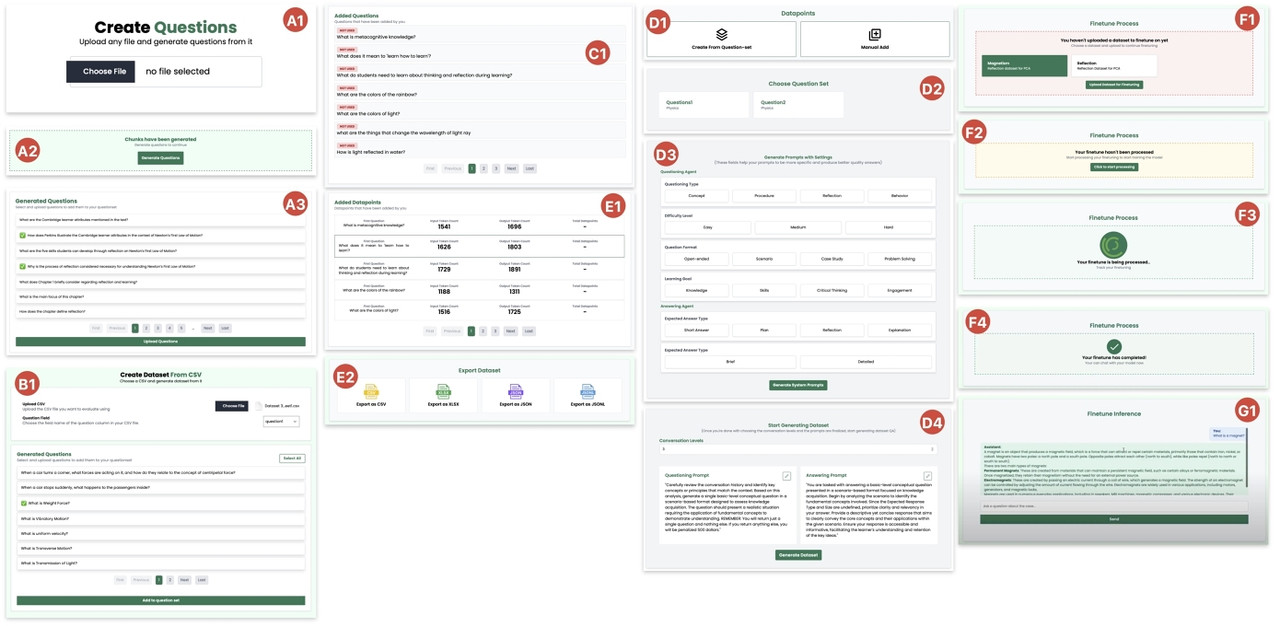
NuevAI: Streamlined Dataset Generator and Human Evaluator System for Development of Pedagogical Conversational Agents
The development of Pedagogical Conversational Agents (PCAs) made significant progress due to the rise of Large Language Models (LLMs). Yet, creating and evaluating PCAs remains a technically challenging task for educators. Our work presents a semi-autonomous system, NuevAI; designed to democratize the access to AI-enhanced educational tools by simplifying the development of PCAs. NuevAI consists of two complementary platforms that help educators create structured, multi-turn conversational datasets from various data sources for fine-tuning LLMs and also facilitates systematic assessment of PCA conversations by learners. From the evaluation of 16 educators from STEM subjects, our system shows notable improvements compared to traditional methods: 74.5% usability score (vs. 50.9% baseline), 81.2% task efficiency (vs. 49.1%), and 80.8% time efficiency (vs. 32.5% baseline). The system achieved a Net Promoter Score of 68.8% (vs. -62.5% baseline) and reduced cognitive workload by 40% as measured by NASA-TLX assessment. By providing user-friendly and intuitive interfaces and automated workflows, NuevAI empowers educators to create adaptive learning tools through PCAs, aligned with specific pedagogical objectives without requiring technical expertise in the field of AI.

NuevAI: Streamlined Dataset Generator and Human Evaluator System for Development of Pedagogical Conversational Agents
The development of Pedagogical Conversational Agents (PCAs) made significant progress due to the rise of Large Language Models (LLMs). Yet, creating and evaluating PCAs remains a technically challenging task for educators. Our work presents a semi-autonomous system, NuevAI; designed to democratize the access to AI-enhanced educational tools by simplifying the development of PCAs. NuevAI consists of two complementary platforms that help educators create structured, multi-turn conversational datasets from various data sources for fine-tuning LLMs and also facilitates systematic assessment of PCA conversations by learners. From the evaluation of 16 educators from STEM subjects, our system shows notable improvements compared to traditional methods: 74.5% usability score (vs. 50.9% baseline), 81.2% task efficiency (vs. 49.1%), and 80.8% time efficiency (vs. 32.5% baseline). The system achieved a Net Promoter Score of 68.8% (vs. -62.5% baseline) and reduced cognitive workload by 40% as measured by NASA-TLX assessment. By providing user-friendly and intuitive interfaces and automated workflows, NuevAI empowers educators to create adaptive learning tools through PCAs, aligned with specific pedagogical objectives without requiring technical expertise in the field of AI.

Enhancing Learning with Pedagogical Conversational Agents: A Human-Centered Approach
The rapid advancement of Large Language Models (LLMs) has opened new opportunities to transform various aspects of human life, including education. This thesis explores the integration of LLMs into teaching through the development of Pedagogical Conversational Agents (PCAs). We incorporate key capabilities such as vector search, image retrieval, code-generated animations, and supervised fine-tuning to create effective PCAs tailored to specific pedagogical objectives. The system that we propose, helps learners acquire core knowledge and deeper conceptual understanding with hint-based mathematical and analytical problem solving. Our approach is applied to K-12 physics, and we evaluate its effectiveness using multiple assessment frameworks. To ensure accessibility for educators with minimal technical expertise, we also implement a dual-platform system that enables non-technical K-12 teachers to create high-quality datasets, fine-tune models, and conduct human evaluations of the generated PCAs with students.

Enhancing Learning with Pedagogical Conversational Agents: A Human-Centered Approach
The rapid advancement of Large Language Models (LLMs) has opened new opportunities to transform various aspects of human life, including education. This thesis explores the integration of LLMs into teaching through the development of Pedagogical Conversational Agents (PCAs). We incorporate key capabilities such as vector search, image retrieval, code-generated animations, and supervised fine-tuning to create effective PCAs tailored to specific pedagogical objectives. The system that we propose, helps learners acquire core knowledge and deeper conceptual understanding with hint-based mathematical and analytical problem solving. Our approach is applied to K-12 physics, and we evaluate its effectiveness using multiple assessment frameworks. To ensure accessibility for educators with minimal technical expertise, we also implement a dual-platform system that enables non-technical K-12 teachers to create high-quality datasets, fine-tune models, and conduct human evaluations of the generated PCAs with students.
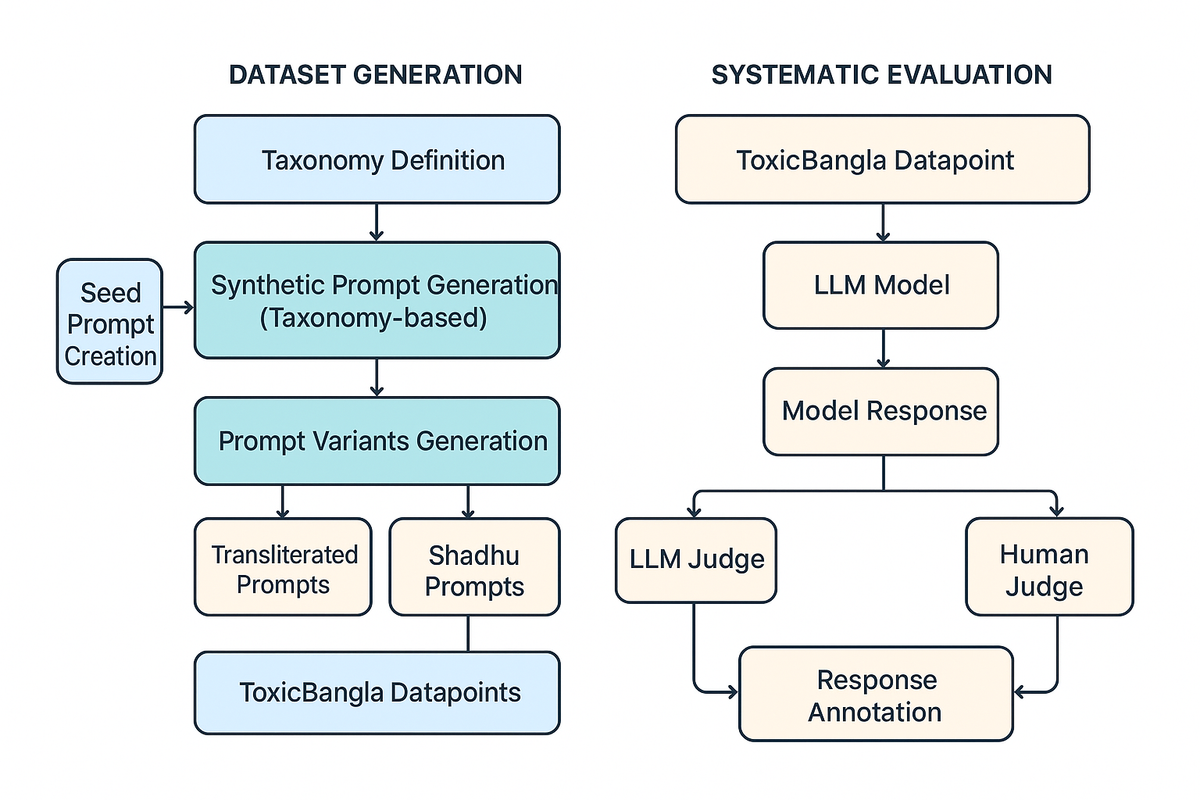
ToxicBangla : A comprehensive Bengali Dataset of Toxic Prompts and A Systematic Evaluation
Recent advancements in large language models (LLMs) have led to notable improvements in safety, with both smaller and larger models becoming increasingly resistant to harmful or inappropriate instructions. Despite this progress, a significant gap remains for low-resource languages such as Bengali, where safety and alignment are still underexplored. In this study, we introduce a curated dataset of 1,362 toxic prompts in Bengali, encompassing native Bengali script, English-transliterated Bengali, and the formal "Shadhu" dialect. These prompts are categorized into five main categories and 32 subcategories to ensure comprehensive coverage of toxicity types. We evaluate six different language models—both proprietary and open-source against this dataset to assess their robustness and alignment. Our work aims to support the development of safer, more responsible, and less biased language models for Bengali, contributing to the broader goal of inclusive and equitable AI.

ToxicBangla : A comprehensive Bengali Dataset of Toxic Prompts and A Systematic Evaluation
Recent advancements in large language models (LLMs) have led to notable improvements in safety, with both smaller and larger models becoming increasingly resistant to harmful or inappropriate instructions. Despite this progress, a significant gap remains for low-resource languages such as Bengali, where safety and alignment are still underexplored. In this study, we introduce a curated dataset of 1,362 toxic prompts in Bengali, encompassing native Bengali script, English-transliterated Bengali, and the formal "Shadhu" dialect. These prompts are categorized into five main categories and 32 subcategories to ensure comprehensive coverage of toxicity types. We evaluate six different language models—both proprietary and open-source against this dataset to assess their robustness and alignment. Our work aims to support the development of safer, more responsible, and less biased language models for Bengali, contributing to the broader goal of inclusive and equitable AI.
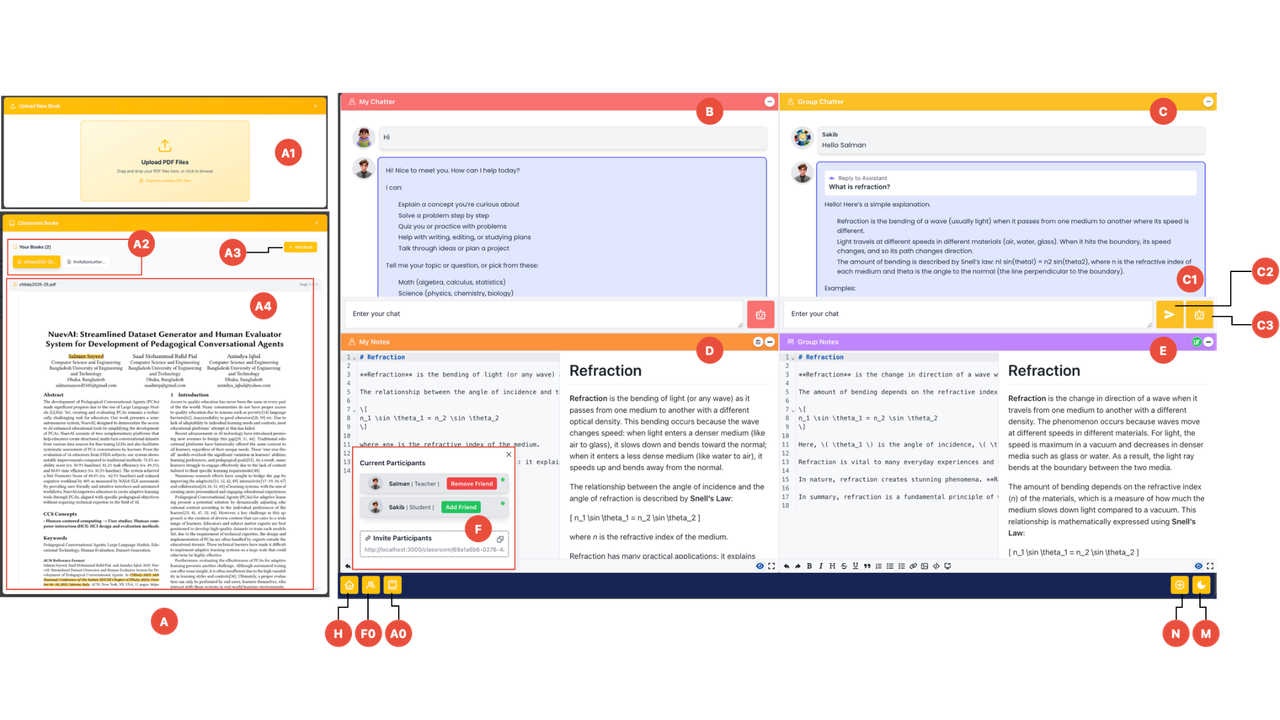
CollaClassroom : An AI-Augmented Collaborative Learning Platform with LLM Support
CollaClassroom is a novel AI-enhanced platform designed to facilitate collaborative learning environments with integrated large language model (LLM) support. Inspired by previous work in Intelligent Tutoring Systems (ITS) and pedagogical conversational agents, our platform offers a virtual classroom experience where participants interact with both peers and LLMs to deepen their understanding of educational content. The system provides five distinct panels for knowledge sharing, personal queries, group discussions, and note-taking. By combining personal and group interactions with the assistance of LLMs, CollaClassroom aims to enhance learning outcomes through interactive problem-solving, concept explanation, and collaborative discussions. This paper evaluates the effectiveness of CollaClassroom based on user feedback and system performance through heuristic evaluation andusability surveys. The results highlight the potential for LLM integration to enrich collaborative learning experiences and support diverse study preferences.

CollaClassroom : An AI-Augmented Collaborative Learning Platform with LLM Support
CollaClassroom is a novel AI-enhanced platform designed to facilitate collaborative learning environments with integrated large language model (LLM) support. Inspired by previous work in Intelligent Tutoring Systems (ITS) and pedagogical conversational agents, our platform offers a virtual classroom experience where participants interact with both peers and LLMs to deepen their understanding of educational content. The system provides five distinct panels for knowledge sharing, personal queries, group discussions, and note-taking. By combining personal and group interactions with the assistance of LLMs, CollaClassroom aims to enhance learning outcomes through interactive problem-solving, concept explanation, and collaborative discussions. This paper evaluates the effectiveness of CollaClassroom based on user feedback and system performance through heuristic evaluation andusability surveys. The results highlight the potential for LLM integration to enrich collaborative learning experiences and support diverse study preferences.

Topic Mapped Text Embeddings: Improving Technical Image Retrieval for K-12 Physics Education
This paper introduces a novel approach to retrieving technical images for K-12 physics using topic-mapped text embeddings. While recent advancements in AI have improved image generations with different styles and even with text, generating accurate technical images remains challenging even for state-of-the-art image generation models. Similar lacking persists for retrieval as well. We have developed a method that maps images to their corresponding topics and subtopics, creating contextually rich text descriptions that better capture the technical relevance of each image. Our experiments compared 21 different approaches across 200 queries on K-12 physics. We also experimented with different retrieval methods including vector embeddings, traditional text retrieval methods (TF-IDF, BM25), and multi-modal CLIP embeddings. Our experiments show that retrieval using vector embeddings of topic definitions and topic-mapped image descriptions achieved 99% retrieval accuracy,significantly outperforms CLIPViT-B-32’s 56% accuracy.This approach can enhance educational applications by correctly pairing concepts with their visual representations, addressing a significant gap in current multi-modal AI systems. This method also shows potential for improving technical image generation by providing better reference materials through accurate retrieval.

Topic Mapped Text Embeddings: Improving Technical Image Retrieval for K-12 Physics Education
This paper introduces a novel approach to retrieving technical images for K-12 physics using topic-mapped text embeddings. While recent advancements in AI have improved image generations with different styles and even with text, generating accurate technical images remains challenging even for state-of-the-art image generation models. Similar lacking persists for retrieval as well. We have developed a method that maps images to their corresponding topics and subtopics, creating contextually rich text descriptions that better capture the technical relevance of each image. Our experiments compared 21 different approaches across 200 queries on K-12 physics. We also experimented with different retrieval methods including vector embeddings, traditional text retrieval methods (TF-IDF, BM25), and multi-modal CLIP embeddings. Our experiments show that retrieval using vector embeddings of topic definitions and topic-mapped image descriptions achieved 99% retrieval accuracy,significantly outperforms CLIPViT-B-32’s 56% accuracy.This approach can enhance educational applications by correctly pairing concepts with their visual representations, addressing a significant gap in current multi-modal AI systems. This method also shows potential for improving technical image generation by providing better reference materials through accurate retrieval.

NuevAI: Streamlined Dataset Generator and Human Evaluator System for Development of Pedagogical Conversational Agents
The development of Pedagogical Conversational Agents (PCAs) made significant progress due to the rise of Large Language Models (LLMs). Yet, creating and evaluating PCAs remains a technically challenging task for educators. Our work presents a semi-autonomous system, NuevAI; designed to democratize the access to AI-enhanced educational tools by simplifying the development of PCAs. NuevAI consists of two complementary platforms that help educators create structured, multi-turn conversational datasets from various data sources for fine-tuning LLMs and also facilitates systematic assessment of PCA conversations by learners. From the evaluation of 16 educators from STEM subjects, our system shows notable improvements compared to traditional methods: 74.5% usability score (vs. 50.9% baseline), 81.2% task efficiency (vs. 49.1%), and 80.8% time efficiency (vs. 32.5% baseline). The system achieved a Net Promoter Score of 68.8% (vs. -62.5% baseline) and reduced cognitive workload by 40% as measured by NASA-TLX assessment. By providing user-friendly and intuitive interfaces and automated workflows, NuevAI empowers educators to create adaptive learning tools through PCAs, aligned with specific pedagogical objectives without requiring technical expertise in the field of AI.

NuevAI: Streamlined Dataset Generator and Human Evaluator System for Development of Pedagogical Conversational Agents
The development of Pedagogical Conversational Agents (PCAs) made significant progress due to the rise of Large Language Models (LLMs). Yet, creating and evaluating PCAs remains a technically challenging task for educators. Our work presents a semi-autonomous system, NuevAI; designed to democratize the access to AI-enhanced educational tools by simplifying the development of PCAs. NuevAI consists of two complementary platforms that help educators create structured, multi-turn conversational datasets from various data sources for fine-tuning LLMs and also facilitates systematic assessment of PCA conversations by learners. From the evaluation of 16 educators from STEM subjects, our system shows notable improvements compared to traditional methods: 74.5% usability score (vs. 50.9% baseline), 81.2% task efficiency (vs. 49.1%), and 80.8% time efficiency (vs. 32.5% baseline). The system achieved a Net Promoter Score of 68.8% (vs. -62.5% baseline) and reduced cognitive workload by 40% as measured by NASA-TLX assessment. By providing user-friendly and intuitive interfaces and automated workflows, NuevAI empowers educators to create adaptive learning tools through PCAs, aligned with specific pedagogical objectives without requiring technical expertise in the field of AI.
Sessions & Keynotes
I've had the previlege to be an AI spokesperson for different organizations, representing and empowering the youth :D

AI Ascend
GenAI Specialization for Banglalink Employees
Campus To Corporate (University) Gamification & AI Session
AI Session for SJWS Students

Digitalyst AI Session
AI Session for Banglalink Digitalyst Interns

Campus To Corporate (SJWS) AI Session
AI Session for SJWS Students

Cracking the Case : From Strategy to Execution
IUT CBS's Biznation 2.0

KBEC Nexus Season 2
Round 1 Judge
Consilium Challenge 2025
Round 1 Judge
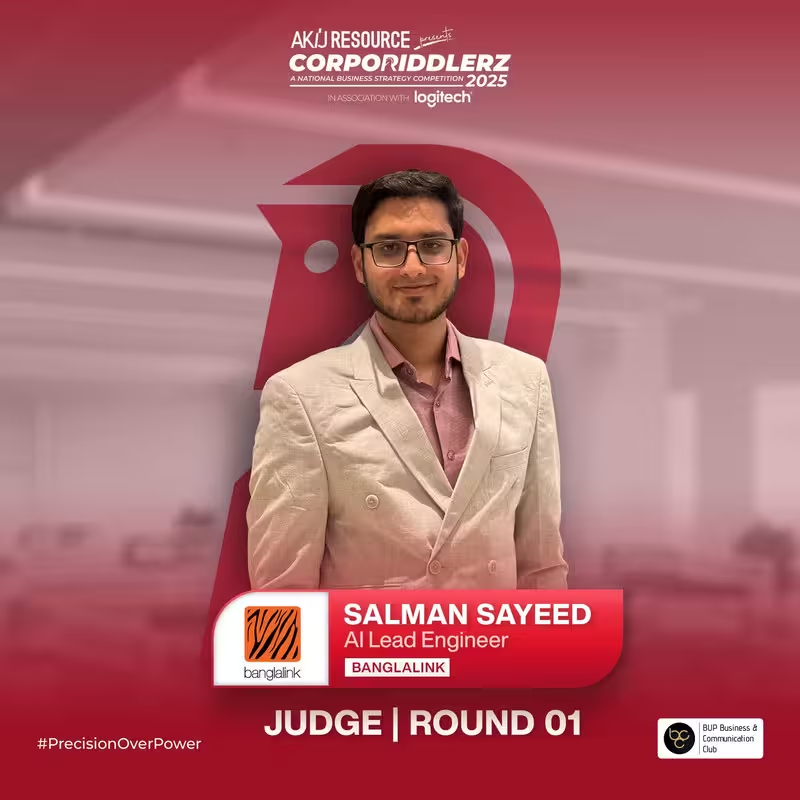
Corporiddlerz by BUP Business and Communications Club
Round 1 Judge

CaseCation by Rajshahi University Business Club
Round 1 Judge
My Institutional Education 🎓
Although I believe that learning comes mostly from experience and getting your hands dirty, acadmic scores are a good way to prove one's competence ;)
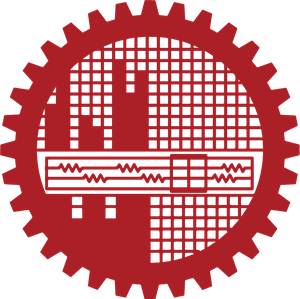
BSc(Engineering) in CSE
Bangladesh University of Engineering and Technology
Feb 2020 - Current
- 🏆Cumulative GPA 3.90
Scholarships & Honors
- 🎓Deans List in Level 4
- 🎓Deans List in Level 3
- 🎓Deans List in Level 2
- 🎓Deans List in Level 1

Higher Secondary Certificate(HSC)
Notre Dame College
2017 - 2019
- 🏆Highest Marks in the country[1215/1300] (Among ~1.4M Students)
- 🏆Honorable Mention Award (Given to 9 out of ~2200 students)
- 🏆Certificate of appreciation , Geo Fest 2017,CMS, Lucknow, India
- 🏆Perfect Attendance Award
Scholarships & Honors
- 🎓Full Free Scholarship (3rd/2200 students) [Half Yearly Exam]
- 🎓Half Free Scholarship (5th/2200 students) [Sent Up-1]

Secondary School Certificate
Notre Dame College
2009-2017
- 🏆93.85% marks in SSC
Scholarships & Honors
- 🎓Talentpool Scholarship in SSC(40th in Dhaka Board)
- 🎓Test Exam Scholarship(2nd/350 students) in 2017
- 🎓Udvashito Mukh SSC 2017 (86th)
- 🎓Pre-Test Exam Scholarship(1st/350 students) in 2016
- 🎓Yearly Exam Scholarship(2nd/350 students) in 2015
- 🎓Half Yearly Exam Scholarship(2nd/350 students) in 2015
- 🎓Talentpool Scholarship in JSC in 2014
- 🎓Test Exam Scholarship(1st/250 students) in 2014
- 🎓PEC Model Test Scholarship(1st/200 students) in 2011
My Trophy Cabinet 🏆
I've spent most of my undergraduate pursuing excellence through differnt competitions (Hackathons, Robotics, Case Competitions) and have won almost everything that was humanly possible to win :D Winning for my country on multiple occassions is my proudest feat ;-;
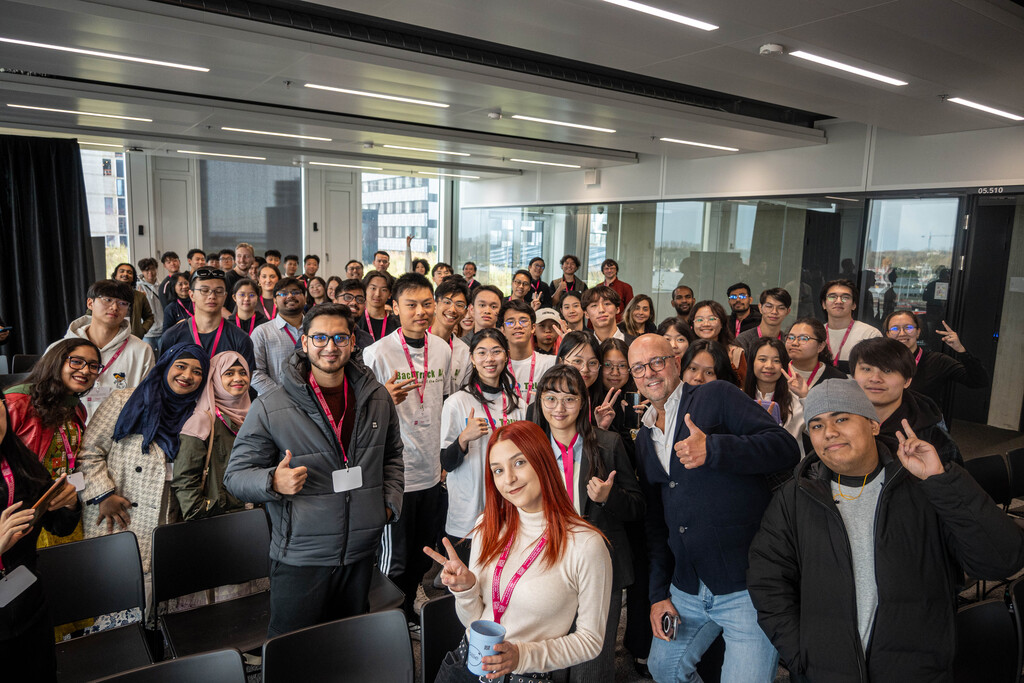
Honourable Mention 🏆
International Data Science Olympiad 2024, Amsterdam, Netherlands
Nov 2024

Champion 🏆
Bangladesh Blockchain Olympiad 2024(AI Track)
Sep 2024

Champion 🏆
Banglalink Ennovators 7.0
Dec 2023

Champion 🏆
Gen-dev Hackathon 2024, ACME AI
May 2024

Champion 🏆
SUST CSE Fest Hackathon, SUST
Feb 2024

Champion 🏆
Hult Prize at Army IBA 2023
Feb 2023

Champion 🏆
Mecheliness 1.0, AUST Mechanical Society
Feb 2023

Champion 🏆
Robo Carnival 2023, BUET Robotics Society
Jan 2023

Champion 🏆
Therap Javafest 2022
Aug 2022

Regional Champions 🏆
NASA Space Apps 2021
Oct 2021

1st Runners Up 🏆
Battle of Minds 2023, British American Tobacco
Aug 2023

1st Runners Up 🏆
SUST Technovent Hackathon 2023, SUST SWE Society
Jan 2023

1st Runners Up 🏆
Hult Prize Chittagong Summit 2021
Mar 2021

1st Runners Up 🏆
MIST Robo Cup
Jul 2020

2nd Runners Up 🏆
ITVerse Techtales
Nov 2023

2nd Runners Up 🏆
Codefest 2021, AIESEC Bangladesh
Dec 2021

2nd Runners Up 🏆
HackNSU, Season 3
Nov 2021

Top 6 🏆
Over the Wall, Marico Bangladesh
Oct 2023

Top 5 Startups 🏆
NEST 2021
Nov 2021
Media & Recognition 📰
I've been featured in various national dailies and corporate pages for competitions, achievements and more :)
Featured In News
Featured Videos
BCOLBD 2024 Ending Ceremony
Few words from the organizers about the Gold Awardee Project from team BUET GRC lead by Salman Sayeed
Official Promo of 'On The Edge' by Banglalink
Promo Video of On The Edge, the team with members, Salman Sayeed(C), Hasrat Humayun, Nazifa Ahmed and Hanan Syed. This team later went on to become the title winner of Ennovators 7.0
Official Promo of 'Azor Ahai' by British American Tobacco Bangladesh
Promo Video of Azor Ahai, the team with members, Salman Sayeed, Azmain Bin Rashid(C), and Hasrat Humayun. This team later went on to become the 1st Runners Up of 20th Battle of Minds
My Travels 🌎
This is my favourite section of this website where I have all of my font memories of the 20 cities across 12 countries that I have visited :D Feel free to have a look into all of my adventures!



